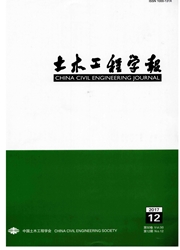

 中文摘要:
中文摘要:
基于混沌动力系统的相空间重构和非线性系统的Volterra级数,分析交通流量的混沌特性,研究了一种交通流量的自适应预测模型。在合理选取嵌入维数和延滞时间实现交通流量时间序列相空间重构的基础上,应用小数据量法计算重构交通流量时间序列的最大Lyapunov指数,根据该指数值对交通流量的混沌特性进行分析,并采用庞卡莱截面法对分析结果进行验证;构建交通流量的Voherra预测模型,并采用LMS自适应算法对模型系数进行调整。通过对实际采集的高速公路交通流量数据的仿真研究表明,小数据量法能对交通流混沌特性进行准确判别,构建的二阶Voherra自适应预测模型能够有效地预测交通流量的变化。因此,在判定交通流量存在混沌特性时,可以应用论文构建的二阶Volterra自适应预测模型对其进行准确的预测。
 英文摘要:
英文摘要:
Based on phase space reconstruction of chaos dynamic systems and Voherra series for nonlinear systems, chaotic property analysis and study on an adaptive prediction model for traffic flow time series are performed. On the basis of phase space reconstruction for traffic flow time series through properly selecting embedding dimension and delay time, for the reconstructed traffic flow time series, the small data set method is applied to calculate the largest Lyapunov exponent for analyzing the chaotic property of traffic flow, and the Poincare section technique to verify the result; a Voherra prediction model for traffic flow time series is constructed and an adaptive LMS algorithm adopted to adjust the coefficients. Simulations for expressway traffic flow time series show that the small data set method can precisely evaluate the chaotic property for traffic flow time series and the adaptive Voherra prediction model is capable of effectively predicting its fluctuation. Therefore, when traffic flow exhibits chaotic property, the constructed adaptive Volterra prediction model can be used to exactly predict its fluctuation.
 同期刊论文项目
同期刊论文项目
 同项目期刊论文
同项目期刊论文
 期刊信息
期刊信息
